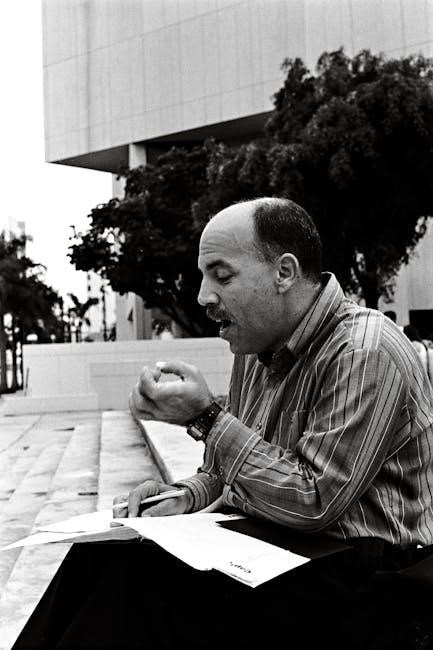Celebrate Recovery is a Christian recovery program addressing hurts, habits, and hang-ups. It provides a safe space for individuals to heal through biblical principles. The Step Study Book 1 guides participants through foundational teachings, emphasizing Step 1: admitting powerlessness. This book is essential for those beginning their recovery journey, offering practical and spiritual guidance.
1.1 Celebrate Recovery Overview
Celebrate Recovery is a widely recognized Christian recovery program designed to help individuals overcome life’s challenges, including addictions, compulsive behaviors, and emotional struggles. Founded by John Baker, the program is rooted in biblical teachings and offers a structured, step-by-step approach to healing. It emphasizes the importance of community, accountability, and spiritual growth.
The program is divided into two main components: the Large Group Meeting and the Small Group (Step Study). The Large Group Meeting features teachings, worship, and testimonies, while the Small Group provides a more intimate setting for participants to work through the 12 steps with a focus on biblical principles. Celebrate Recovery also offers Open Share Groups, where individuals can share their experiences and encouragement with others facing similar struggles.
The Step Study Book 1 serves as a foundational guide for participants, outlining the initial steps of recovery. It encourages individuals to confront denial, acknowledge their powerlessness, and surrender to God. This book is particularly important for those new to the program, as it provides practical exercises and biblical insights to support their journey. By combining spiritual teachings with real-life applications, Celebrate Recovery creates a holistic approach to healing that addresses the physical, emotional, and spiritual aspects of recovery.
Overall, Celebrate Recovery is more than a program—it’s a community of believers walking together toward freedom and wholeness. Its emphasis on faith, accountability, and personal growth has made it a vital resource for millions seeking transformation and hope.
1.2 Purpose and History
Celebrate Recovery is a faith-based recovery program designed to help individuals overcome life’s challenges, including addictions, compulsive behaviors, and emotional struggles. Founded in 1991 by John Baker at Saddleback Church, the program combines biblical teachings with the 12-step recovery model. Its primary purpose is to provide a safe, supportive community where people can share their experiences, find hope, and grow spiritually.
The program’s history began with a vision to create a space where individuals could openly discuss their struggles within a church environment. Baker, who struggled with alcohol addiction himself, recognized the need for a recovery program rooted in Christian principles. Over the years, Celebrate Recovery has grown into a global movement, with thousands of churches offering the program. Its success lies in its ability to address a wide range of issues, from substance abuse to codependency, while emphasizing the transformative power of faith.
The program’s foundation is built on eight recovery principles, known as the Beatitudes, which provide a biblical framework for healing. These principles guide participants through the recovery process, encouraging them to rely on God for strength and guidance. By fostering accountability, compassion, and spiritual growth, Celebrate Recovery has become a vital resource for those seeking lasting transformation.
Today, Celebrate Recovery continues to expand, offering step study groups, open share groups, and specialized resources like the Step Study Book 1. Its enduring impact is a testament to the power of community and faith in the journey toward healing and wholeness.

Step Study Book 1
Step Study Book 1 is the foundational guide for Celebrate Recovery, introducing participants to the 12-step program infused with biblical principles. It focuses on acknowledging powerlessness and breaking denial, providing practical exercises and lessons to apply Step 1 effectively. This book is essential for those beginning their recovery journey, offering clear guidance and spiritual support.

2.1 Structure and Content

The Step Study Book 1 is structured to guide participants through the initial stages of recovery, focusing on the foundational principles of Celebrate Recovery. The book is divided into lessons, each addressing specific aspects of the recovery process. It begins with an introduction to the program, followed by a detailed exploration of Step 1, which emphasizes admitting powerlessness over addictions and compulsive behaviors. The content is designed to be interactive, with exercises and reflection questions that help participants apply the teachings to their personal lives.
Each lesson in Book 1 includes biblical teachings, real-life examples, and practical steps to break down denial and confront the realities of addiction. The material is presented in a clear and accessible manner, making it easy for participants to follow and engage with the content. The book also provides guidance for group discussions, encouraging transparency and accountability among participants. By the end of Book 1, individuals are equipped with the tools and understanding necessary to move forward in their recovery journey.
The structure of Book 1 ensures a gradual and comprehensive approach to healing, addressing both the spiritual and emotional dimensions of recovery. It serves as a solid foundation for the subsequent steps in the Celebrate Recovery program, preparing participants to delve deeper into their personal struggles and experiences. The content is both informative and transformative, offering hope and encouragement to those seeking freedom from their addictions and compulsive behaviors.

2.2 Key Themes
Step Study Book 1 of Celebrate Recovery focuses on several key themes that are essential for the recovery process. The primary theme is the acknowledgment of powerlessness over addictions and compulsive behaviors, as outlined in Step 1. This theme emphasizes the importance of recognizing one’s inability to control their struggles without divine intervention.
Another central theme is the role of denial and its impact on the recovery journey. The book explores how denial can prevent individuals from addressing their true struggles and provides practical steps to break free from it. Additionally, the theme of faith is introduced, highlighting the necessity of trusting in a Higher Power to facilitate healing and transformation.

The book also delves into the concept of surrender, encouraging participants to relinquish control and submit their lives to God. This theme is supported by biblical teachings and real-life examples, illustrating how surrender is a critical step toward lasting recovery. Furthermore, the importance of community and accountability is emphasized, as participants are encouraged to share their experiences and support one another in their journeys.
Overall, Step Study Book 1 lays a strong spiritual and emotional foundation for recovery, equipping participants with the tools and understanding needed to address their hurts, habits, and hang-ups effectively; The themes presented are designed to inspire hope, foster growth, and guide individuals toward a life of freedom and wholeness.
Step 1: Admitting Powerlessness
Step 1 in Celebrate Recovery emphasizes admitting powerlessness over addictions and compulsive behaviors, recognizing life’s unmanageability. This foundational step encourages breaking denial, acknowledging the need for a Higher Power. Biblical teachings, such as Romans 7:18, support this principle, guiding participants to surrender and seek divine help for true transformation and healing.
3.1 Explanation and Biblical Foundation
Step 1 in Celebrate Recovery focuses on admitting powerlessness over addictions and compulsive behaviors, acknowledging that life has become unmanageable. This step is rooted in biblical teachings, emphasizing the inability to overcome struggles through self-effort alone. Romans 7:18 highlights humanity’s inherent weakness, while Proverbs 3:5-6 encourages trusting God rather than human understanding. By surrendering to this reality, participants open themselves to divine intervention and guidance, aligning with the Christian principle of dependence on God for transformation. This step lays the spiritual groundwork for the recovery journey, encouraging humility and recognition of the need for a Higher Power. The biblical foundation reinforces the idea that true healing begins with acknowledging one’s limitations and seeking God’s strength. This principle is central to Celebrate Recovery’s approach, providing a clear path toward freedom and restoration through faith.
3.2 Breaking Down Denial
Breaking down denial is a critical component of Step 1 in Celebrate Recovery. Denial often prevents individuals from acknowledging the severity of their struggles, making it impossible to seek true healing. Celebrate Recovery addresses this by providing a safe and supportive environment where participants can confront their denial honestly. The program emphasizes the importance of self-awareness and transparency, encouraging individuals to examine areas where denial may be hindering their progress.
The study materials, such as the Participant’s Guide 1, offer practical tools and biblical teachings to help participants identify and overcome denial. For instance, Lesson 1 focuses on denial, guiding individuals to recognize how it has impacted their lives and relationships. The Celebrate Recovery Bible also plays a key role, with specific readings and principles that address the dangers of denial and the liberation found in truth.
Through small group discussions and personal reflections, participants are encouraged to share their experiences and insights. This process fosters accountability and understanding, helping individuals move beyond denial and into a place of authenticity. The program underscores the biblical principle that “the truth will set you free” (John 8:32), emphasizing that freedom from addiction and compulsive behaviors begins with acknowledging the truth about one’s powerlessness.
Ultimately, breaking down denial is not just about admitting struggles but also about embracing humility and surrender. Celebrate Recovery provides a structured and compassionate approach to this process, empowering individuals to confront their denial and take the first steps toward lasting recovery.
3.3 Practical Steps
The Celebrate Recovery Step Study Book 1 provides clear, actionable steps to help participants progress through Step 1. Admitting powerlessness is not just an intellectual exercise but a heartfelt acknowledgment of one’s inability to control addictive or compulsive behaviors. The program encourages participants to write down specific areas of powerlessness, creating a tangible record of their struggles. This exercise helps individuals confront denial and take ownership of their actions.
Sharing these admissions in a safe, small-group setting is another practical step. Celebrate Recovery emphasizes the importance of transparency and accountability. By voicing their struggles aloud, participants experience liberation from secrecy and shame. The Participant’s Guide 1 includes prompts and questions to guide these discussions, ensuring that sharing is focused and meaningful.
Prayer is also a key practical step. Participants are encouraged to pray for insight and courage, seeking God’s guidance as they confront their powerlessness. The program provides specific prayers and biblical references, such as Romans 7:18, to help individuals align their hearts with God’s truth. This spiritual dimension reinforces the idea that recovery is not just about self-effort but about surrendering to a higher power.
Finally, the program encourages participants to identify accountability partners or sponsors. These individuals provide ongoing support and encouragement, helping participants stay committed to their recovery journey. By combining personal reflection, group sharing, prayer, and accountability, Celebrate Recovery offers a holistic approach to breaking free from denial and embracing the truth of Step 1.

Step 2: Coming to Believe
Step 2 emphasizes building faith in a Higher Power. Participants explore biblical teachings on trust and surrender, such as Proverbs 3:5-6. Practical steps include prayer, journaling, and group discussions to deepen understanding. This step helps individuals shift from self-reliance to reliance on God, fostering spiritual growth and hope for recovery.
4.1 Understanding Faith
Faith is a cornerstone of Celebrate Recovery, particularly in Step 2. It is defined as trusting God, even when circumstances seem uncertain. The program emphasizes that faith is not about understanding everything but about surrendering to God’s plan. Biblical teachings, such as Hebrews 11:6, highlight that faith is essential for pleasing God. Participants are encouraged to reflect on their beliefs and how they align with scripture.
The Step Study Book 1 provides practical exercises to help individuals deepen their faith. It distinguishes between intellectual belief and active trust in God. Discussions often focus on how faith applies to real-life struggles, such as addiction or emotional pain. By exploring biblical examples, participants learn to rely on God’s power rather than their own strength.
Faith is also nurtured through community and accountability. Sharing personal stories and testimonies within groups fosters a sense of connection and reinforces trust in God’s redemption. The program encourages participants to pray, seeking God’s guidance and strength. This step is crucial as it lays the spiritual foundation for the recovery journey ahead.
Ultimately, understanding faith in Celebrate Recovery involves recognizing it as a journey, not a destination. It’s about embracing God’s love and sovereignty, even in the midst of challenges. This step helps participants shift their focus from self-reliance to dependency on a Higher Power, which is vital for lasting transformation and healing.
4.2 Biblical Teachings
Celebrate Recovery deeply roots its teachings in scripture, particularly in Step 2, where faith is explored. The program emphasizes key biblical principles to help participants trust God and His plan for their lives. Central to this step is the understanding that faith is not merely intellectual belief but active trust in God’s power and promises.
One of the foundational scriptures used is 2 Corinthians 5:7, which encourages walking by faith, not by sight. This verse underscores the importance of trusting God even when circumstances are uncertain. Another critical teaching is found in Proverbs 3:5-6, which instructs believers to trust in the Lord with all their hearts and not rely on their own understanding. This passage is particularly relevant for those struggling with addiction or compulsive behaviors, as it reminds them of their need for divine guidance.
The Step Study Book 1 also highlights Hebrews 11:6, which states that without faith, it is impossible to please God; This verse serves as a reminder that faith is essential for a meaningful relationship with Him. Additionally, the program draws from Psalm 25:4-5, emphasizing the importance of trusting in God’s mercy and guidance. These teachings are woven into the study materials, providing participants with a biblical framework for understanding and applying faith in their recovery journey.
By focusing on these scriptures, Celebrate Recovery helps participants build a strong spiritual foundation, enabling them to rely on God’s power rather than their own. This biblical approach is central to the program’s effectiveness in fostering lasting transformation and healing.
4.3 Application
The application of Step 2 in Celebrate Recovery involves practical steps to deepen faith and trust in God. Participants are encouraged to share their experiences in small groups, fostering accountability and community. This sharing helps individuals process their struggles and apply biblical truths to their lives.
A key part of the application is personal reflection and prayer. The Step Study Book 1 provides exercises that guide participants to identify areas where they can surrender control to God. For example, journaling about specific struggles and asking God for guidance is a common practice. This helps individuals move from intellectual belief to active trust in God’s sovereignty.
Another practical aspect is the emphasis on community. Celebrate Recovery encourages participants to build relationships with sponsors or accountability partners. These relationships provide support and encouragement as individuals navigate their faith journey. The program also incorporates worship and testimonies, which inspire and remind participants of God’s transformative power.
By applying these principles, participants begin to see their lives through a spiritual lens, recognizing God’s role in their recovery. The program’s focus on action, rather than just theory, equips individuals with tools to live out their faith daily. This application is central to Celebrate Recovery’s mission of helping people achieve lasting healing and spiritual growth.

Step 3: Surrendering to God
Step 3 focuses on surrendering life and will to God’s care. It emphasizes letting go of control and trusting in His plan. Biblical teachings highlight surrender as an act of faith, while practical steps encourage participants to seek God’s guidance and live according to His will, fostering spiritual transformation and reliance on His power.
5.1 Decision Making
In Step 3 of Celebrate Recovery, decision making is a critical process where individuals commit to surrendering their lives to God. This step involves recognizing the need to let go of self-control and instead trust in God’s plan. The Step Study Book 1 provides guidance on how to make this decision, emphasizing the importance of faith and trust in God’s will. Participants are encouraged to reflect on their past decisions and how they have led to their current circumstances, fostering a deeper understanding of the need for surrender.
The book outlines practical steps to help participants make this decision, such as prayer, meditation, and seeking guidance from sponsors or mentors. It also highlights the biblical foundation for surrender, referencing scriptures that encourage believers to trust in God’s sovereignty. By making this decision, participants take a significant step toward spiritual transformation and reliance on God’s power rather than their own strength.
Decision making in this context is not just about choosing a different path but about embracing a new way of life centered on God. The Step Study Book 1 equips participants with the tools and insights needed to make this life-changing decision, leading them toward a more fulfilling and purpose-driven life in Christ.
5.2 Biblical Surrender
Biblical surrender is a cornerstone of Step 3 in Celebrate Recovery, emphasizing the act of yielding one’s life to God’s control. This concept is deeply rooted in scripture, where believers are called to surrender their will to Christ. The Step Study Book 1 explores this principle, providing a biblical foundation for surrender and its role in the recovery process.
The book highlights key scriptures, such as Romans 12:1-2, which encourages believers to offer their lives as living sacrifices, and Galatians 2:20, which emphasizes living by faith in Christ. These teachings underscore the idea that true freedom comes from surrendering to God’s plan rather than striving to control life’s circumstances.
Biblical surrender is not a one-time decision but a continuous process of trusting God’s sovereignty. The Step Study Book 1 guides participants in applying this principle to their struggles, whether addiction, compulsive behaviors, or emotional pain. By surrendering, individuals acknowledge their inability to overcome these challenges alone and invite God to work in their lives.
This section also addresses common misconceptions about surrender, such as the fear of losing autonomy. It reassures participants that surrendering to God leads to liberation, not restriction, as it aligns their desires with His will. The book encourages participants to prayerfully examine areas of resistance and take practical steps toward surrender, fostering spiritual growth and healing.
5.3 Real-Life Examples
Real-life examples in Step Study Book 1 illustrate the transformative power of surrendering to God. These stories, shared by participants and leaders, provide practical insights into how biblical surrender applies to everyday struggles. For instance, one participant shared their journey of surrendering an addiction, highlighting how admitting powerlessness and trusting God led to breakthrough. Another example detailed a struggle with compulsive behaviors, showing how surrendering control allowed God to restore peace and balance in their life.
These examples emphasize that surrender is not a passive act but an active choice to trust God’s plan. They demonstrate how surrendering fears, doubts, and strongholds opens the door to healing and freedom. The book also includes testimonies of individuals who, after resisting God’s prompting, finally surrendered and experienced profound spiritual growth. These stories serve as encouragement for participants to apply the principles of Step 3 in their own lives.
The real-life examples in the book are relatable and diverse, addressing various forms of brokenness. They show how surrender is a continuous process, often requiring patience and perseverance. By sharing these stories, Celebrate Recovery creates a sense of community and hope, reminding participants that they are not alone in their journey. The examples also highlight the importance of prayer, accountability, and reliance on Scripture as key components of surrender.
These narratives are not just inspirational but also instructional, guiding participants in applying Step 3. They illustrate how surrendering to God leads to a deeper relationship with Him and the empowerment to overcome life’s challenges. Through these examples, the book reinforces the message that surrender is both a spiritual and practical step toward lasting recovery.



